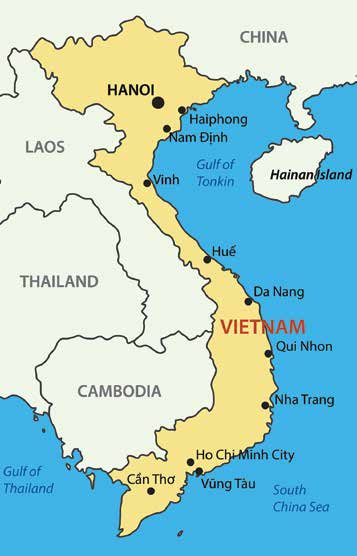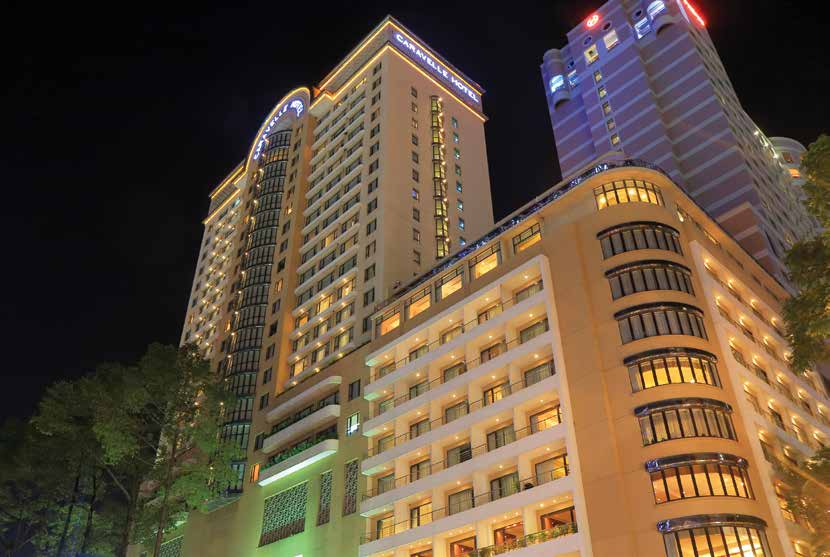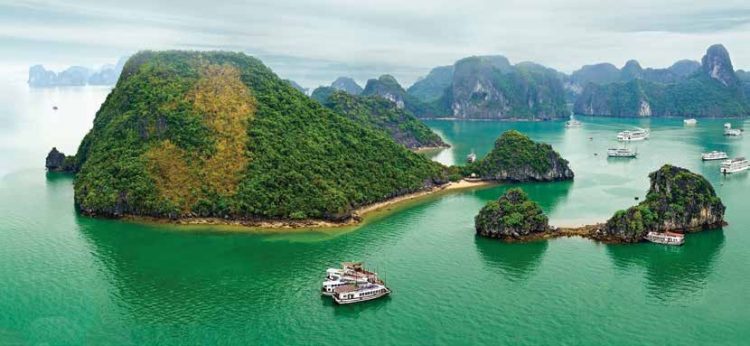In the second of a two-part series examining Cambodia and Vietnam, MdME’s Rui Pinto Proença guides us through the regulatory framework surrounding the Vietnamese gaming industry.
After a long (and, for some, painful) wait, the Government of Vietnam has issued its Decree no.3 on Casino Business (Decree no.03/2017/ND-CP). In the making since 2012, Decree no.3 was part of a larger regulatory package for the gaming industry. This included a Decree on Betting Business with regards to Horse and Greyhound Racing and International Soccer as well as an amendment to the Decree governing electronic slot halls.
With six times the population of Cambodia and more than double its GDP per capita, the Socialist Republic is a very different reality than the Kingdom from an economic, political and cultural standpoint. The distinctions between both countries are also found in their respective gaming markets and are quite evident in the paths they have taken to regulate the industry.
While both lacked a clear and well defined regulatory framework, Cambodia has been far more relaxed in allowing casinos to mushroom along its borders. On the other hand, the Vietnamese government has taken a stricter approach to gambling. Generally prohibited, the only legal forms of gambling until the enactment of Decree no. 3 had been horse and greyhound racing as well as the state lottery. The government also allowed for foreigners-only slot halls (located within five star hotels in urban areas) and, on an ad hoc basis, for foreigners-only casinos (seven licenses have been issued so far).
Contrary to Cambodia’s LMGT, the policy priorities of Decree no.3 are not, therefore, to reign in a rampant border casino scene but to provide clarity going forward to a tightly controlled industry. The inexistence of a zoning policy also suggests that, in contrast to the Kingdom, Vietnam’s strategy is not to develop an IR cluster in specific tourism destinations. Instead, the provisions of the Decree seem to indicate that the Government’s preference would be to spread out the economic benefits of gaming through different provinces. At the same time, the introduction of a local participation pilot scheme aims at balancing the need to curb the estimated US$800 million that Vietnamese are said to gamble overseas (mostly in the Cambodian border town of Bavet) with the social impact that may come with it. Here are some of the Decree’s most relevant features.

Governing Scope. Decree no. 3 regulates the “casino business”, which it defines as the offer of games with prizes on electronic gaming machines and gaming tables to eligible patrons. A game qualifies as a game with prizes if its outcome is dependent on luck, or a combination of luck and skill, and a player pays to participate with the possibility of winning a prize in money or kind. Unlike the Cambodian LMGT, Decree no. 3 does not open the door for licensing of online gaming, which is strictly prohibited thereunder.
The casino business may only be pursued by duly licensed Casino Business Enterprises. These are divided by volume of investment into two categories: Large Scale, ones with a minimum capital investment of US$2 billion, and Small Scale, ones with a capital investment below US$2 billion. Minimum capital requirements are measured against investment in an integrated resort, labelled by the Decree as a “Tourism Zone” and defined as a group of buildings servicing tourism, entertainment, resort and commerce, where casino business is also allowed.
Zoning. Contrary to the Cambodian LMGT, you cannot find a strong zoning component in Decree no. 3. In fact, there is only one provision referring to casino locations. It determines that each licensed casino business enterprise may only operate in one pre-approved location. Contrary to Cambodia, Vietnam is an atheist state and although most of the population follows Buddhism, the creation of game-free zones for religious reasons is not a concern of the government. At the same time, there are also no zoning concerns based on social safeguards. This is simply because local participation will be the exception, not the rule, and the pilot scheme mechanism will allow the government to determine on a case-to-case basis where locals will be allowed to play.
Licensing. Decree no. 3 subjects the operation of casinos to obtaining several licenses (certificates). The Decree does not determine a minimum or maximum number of licenses to be issued but it does set out the process for applying and obtaining one.
An entity wishing to operate a casino must first obtain an approval-in-principle to the investment policy permitting the development of an IR with a casino. Although the Decree is not specific as to which entity should issue such approval, all matters of policy in respect of casino business must be decided by the Prime Minister upon consultation with the Ministry of Finance.
At a second stage, an applicant must seek an Investment Registration Certificate (IRC) in accordance with the Vietnam Law on Investment (which took effect in July 2015). An IRC may only be issued to casino businesses pursued in the context of an IR with a minimum investment of US$2 billion.
Upon obtaining an IRC, an applicant must apply for and obtain a Certificate of Satisfaction of Conditions for Casino Business (an SC Certificate). It may only do so when it has invested 50% of the total capital commitment determined on its IRC. It must also have a defined gaming area in full compliance with requisites determined by the Decree, a designated general manager and submit a business operational plan and its proposed internal controls and game rules. The entity responsible for determining the application is the Ministry of Finance which must do so in no more than 60 business days.
An SC certificate for casino business will specify the effective duration of the license, which shall not exceed 20 years, renewable for a maximum of 10. An SC certificate will also determine the number of gaming machines and gaming tables which the licensee will be able to offer, within the parameters set out by the Decree. These are set according to the approved capital commitment with a maximum ration of one table and 10 gaming machines for each US$10 million of investment.
Finally, if an entity which has been awarded an SC Certificate wishes to receive and disburse foreign currency and conduct other forex activities it must apply for and receive a forex license from the State Bank.

Regulator. This is where things get complicated. The Decree does not create a centralized regulatory agency or a department of government dedicated to governing and regulating the gaming sector. Instead, powers and responsibilities are divided between nine different ministries and agencies. Within this maze, the Ministry of Finance stands out as the entity empowered to issue SC Certificates and to supervise and enforce the provisions of the Decree. In addition, all matters of policy, as well as the number of tables and machines authorized for each licensee, are to be decided directly by the Prime Minister.
Gaming Promotion. There is no reference whatsoever in the Decree to junket operators, nor to the extension of credit for gaming. On the other hand, those activities are not listed therein as prohibited conducts. This omission, when read together with a provision that allows for casino enterprises to carry out a policy on price discount – a local euphemism for junket commissions – and promotions (sic) in accordance with the current law on tax and other relevant laws, opens the door, and the expectations, that there will be clarity over these issues in subsequent regulations.
Participation. Local participation is the most controversial point of Decree no.3. The rule imposed is no different than the one that preceded it: only foreigners and Vietnamese residing overseas who hold a foreign passport are allowed to play. However, the Decree also introduces an exceptional regime that will allow eligible locals to play in certain locations during a three-year trial period. Vietnamese nationals are eligible to play in such locations if they are at least 21 years of age, able to prove a regular monthly income of approximately US$450 and purchase an entry pass from one of the authorized casinos at a cost of approximately US$44 a day or US$1,000 a month.
While some applaud the move as an important first step to allow local play – a must have for many international gaming companies – others see the restrictions as too tight and are naturally reluctant to commit US$2 billion without knowing what will be at the end of the three-year trial.
The trial period has been fueling speculation as to which locations and operators will be granted the ability to allow local participation. The Decree does not impose any maximum number and does not determine the criteria to apply for such a possibility. Two locations have been regularly tipped as being ahead of the pack in this race: the Van Don Economic Zone in Quang Ninh province, in the north, and Phu Quoc Island in the south. The only similarities between the two are the fact that they are both under development and are both owned by Vietnamese companies.
Tax. The Decree does not directly set out the applicable tax rate but rather refers to the current laws on taxation. This means that gambling services will be applied a special sales tax of 35%, setting a total tax rate close to Macau’s 39%. However, local tax experts argue that tax rebates allowed for marketing and promotion expenses may apply to junket commissions, thus estimating for a real tax rate on the VIP segment to be somewhere between 13% to 15%.
The enactment of Decree no.3 represents a step forward in defining a regulatory framework for the industry. It no doubt gives existing and prospective investors more certainty on which to ground their decisions. However, key issues such as junkets and credit, tax treatment of commissions and criteria to apply for local participation still lack clarity and need subsequent regulation.
On the other hand, the lack of a dedicated regulatory agency will most likely translate into a hard-to-navigate bureaucratic maze. However, once light is eventually shed on those outstanding issues, the most important question must still be asked: with a US$2billion price-tag, a top of the scale GGR tax and local participation stringed to a three-year pilot scheme, will Vietnam be able to attract household industry names under the framework of Decree no.3? Only these would be able to bring the sector to an international level and they don’t seem impressed thus far.




























